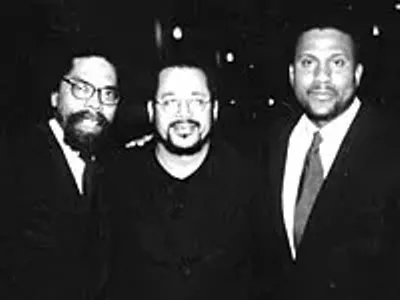
Audio By Carbonatix
[
{
"name": "GPT - Leaderboard - Inline - Content",
"component": "35519556",
"insertPoint": "5th",
"startingPoint": "3",
"requiredCountToDisplay": "3",
"maxInsertions": 100,
"adList": [
{
"adPreset": "LeaderboardInline"
}
]
}
]
Federal prosecutor Richard Convertino stood before a judge last week in a courtroom packed with reporters, lawyers and onlookers. He often referred to his notes and stared down at the podium as he explained why he failed to turn over evidence that defense attorneys say could have exonerated the men convicted in June in the nation’s first post-Sept. 11 terror trial.
U.S. District Court Judge Gerald Rosen convened the four-hour hearing last week to question Convertino and others about the government’s failure to disclose the material.
Rosen must now decide whether the evidence could have affected the convictions of Karim Koubriti and Abdel-Ilah Elmardoudi, who were found guilty of conspiring to support terrorists, and of document fraud. A third defendant, Ahmed Hannan, was convicted only of document fraud while a fourth, Farouk Ali-Haimoud, was acquitted after the nine-week trial.
If Rosen decides that the evidence could have altered the outcome, they will be entitled to a new trial. That ruling is weeks away.
The documents Rosen must review include a letter written by Milton “Butch” Jones, who founded the infamous Young Boys Inc. drug gang and was twice convicted of drug sales in the 1980s. Jones, who is now awaiting trial for murder and new drug charges, wrote to the Justice Department stating that he was in Wayne County Jail with Youssef Hmimssa, who would later become the government’s star witness in the terror trial.
Hmimssa, once a roommate of the four defendants, originally was charged in the case. But he cut a deal with the government and testified against them; he was to be sentenced last week, but it was canceled when Rosen learned about the new evidence. The prosecution’s case hinged on Hmimssa, who testified that his ex-roommates were devoted to terror.
In his letter, Jones, who was in a cell adjacent to Hmimssa’s, wrote that Hmimssa claimed to have “lied to the FBI.”
The letter came to light after the conclusion of the terror case; its verdicts are being appealed. The case has since been reassigned to federal prosecutor Eric Straus, who recently gave Jones’ letter and other records to defense attorneys.
Rosen questioned several prosecutors, including Joseph Allen, who received the Jones letter in February 2002. Allen, the prosecutor in Jones’ current case, told Rosen that he immediately gave the letter to Convertino and told their supervisor, Alan Gershel, about it. He said that Gershel told him that he had instructed attorney Keith Corbett, Convertino’s immediate supervisor, to disclose Jones’ letter to the defense. Gershel confirmed that he told Corbett this. Corbett, who assisted Convertino in the prosecution, said he does not recall Gershel ordering him to disclose Jones’ letter.
“I’m not suggesting the conversation didn’t take place,” said Corbett. “I have no recollection of the conversation.”
Corbett who joined Convertino on the case in the fall of 2002, said he first saw the letter during the trial and decided to not turn it over because of a notation in the corner of it. Rosen would not allow Corbett to discuss the notation in open court and asked him to submit an affidavit about the notation, which will be sealed from the public.
As the trial unfolded, Allen said, he grew concerned that the defense had never introduced Jones’ letter in an effort to impeach Hmimssa’s testimony. “It was puzzling to me,” he said.
Convertino admitted that Allen told him about Jones’ letter. But he said he gave it little weight because “The letter struck me as absurd.”
When Rosen asked why he didn’t disclose it, Convertino said he was dealing with thousands of records at the time and “It slipped through the cracks.”
Rosen asked why Convertino didn’t turn the letter over to the judge for inspection.
“[I] didn’t think the references were of any value or importance,” he said.
Rosen retorted that this was not for Convertino to decide.
“On its face, the letter contains exculpatory information and that’s not a decision the prosecution makes,” Rosen said.
“I don’t disagree,” Convertino responded. “If someone said, ‘Turn it over,’ I would. It’s no value to the defense by my estimation.”
Convertino claimed that he was never instructed to turn the letter over to the defense.
Jones, who was advised by his attorney to invoke his Fifth Amendement right against self-incrimination, would not say whether he wrote the letter. Jones’ lawyer, Harold Gurewitz, said he feared his client’s testimony at last week’s hearing would be used against him in his own criminal case, in which the government is seeking the death penalty.
Rosen encouraged the Justice Department to grant Jones immunity, which would allow him to testify about the letter with the assurance that his statements would not be used against him in his criminal case.
Additional evidence that prosecutors failed to turn over to defense lawyers include FBI reports of interviews with Zouhaier Rouissi, who had lived with two of the defendants in Ohio and Dearborn. The reports state that Rouissi told the FBI that the terror defendants were not religious, never spoke of terrorism and that they drank and smoked hashish. Rouissi was deported for marriage fraud last year.
Larry Dubin, a University of Detroit Mercy School of Law professor who specializes in legal ethics, says prosecutors are held to higher ethical standards than other attorneys.
“There is a specific ethics rule that states that prosecutors are ministers of justice and are not simply out to obtain a conviction, but rather to seek justice,” he says. “They have to turn over exculpatory evidence to an accused. This is an obligation that only applies to prosecutors.”
Dubin says the Michigan Attorney Grievance Commission could investigate Convertino and Corbett for possible prosecutorial misconduct.
“This issue has received enough publicity where the commission could seek an investigation,” says Dubin.
Does the grievance commission plan to investigate the federal prosecutors for possible misconduct? Robert Edick, deputy administrator for the Michigan Attorney Grievance Commission, says it normally initiates investigations after a grievance is filed with the agency. Edick expects to receive one after Rosen issues his ruling. If a complaint is not filed, the commission could still initiate an investigation though it is barred from sharing this with the public unless the probe results in disciplinary action, he says.
Déjà vu
This is not the first time that the government has been accused of withholding documents. Throughout the trial, defense attorneys repeatedly complained that the government had hoarded vital evidence. Their motions allege that Convertino and Corbett withheld FBI reports that may have enabled the defense to undermine Hmimssa’s credibility.
Defense lawyers accused the prosecutors of failing to turn over three reports of conversations with Brahim Sidi, an associate of Hmimssa’s. The reports are dated Jan. 3, 11 and 25, 2002. Defense attorneys said they did not receive the reports until May 5, when the trial was under way, according to court records. They claimed in court papers that the reports, which are sealed from public view, would have cleared their clients and showed that Hmimssa is not a credible witness.
Defense attorneys said the government’s withholding of the key reports prevented them from adequately cross-examining Hmimssa. They also accused the government of intentionally deporting Sidi to Morocco in December, “thereby depriving the defendants of his testimony at trial.”
Sidi had been arrested in Iowa with Hmimssa. He pleaded guilty to document fraud and served about seven months in jail before his deportation.
At the time, lawyers for the defendants had asked the judge to declare a mistrial, claiming that the prosecution had employed unfair tactics.
The defense attorneys were not the only ones to complain about government tactics during the trial.
Judge Rosen was visibly angry when federal prosecutors presented surprise evidence during the trial.
“I was shocked,” said Rosen of a photo shown to jurors without advance notice to the judge. “The government is playing this awfully close to the vest, not only with the defense, but with the court.”
After jurors left the courtroom that day, Rosen reprimanded the prosecutors and demanded to know why they had not told him they intended to present a photo of Nabil Almarabh and to connect him to the defendants.
After the terror attacks of Sept. 11, 2001, the FBI attempted to track down Almarabh, whom they suspected of being a terrorist. Agents went to a house on Norman Street in Detroit, believing Almarabh lived there. Instead, they found three of the four defendants, and arrested them. At the time, Convertino told Rosen that he presented the photo of Almarabh at trial because the government believed that he and the defendants know each other and that the Norman Street home was a “safe house” for a terrorist sleeper cell.
“I understand the government’s theory and allegations,” said Rosen.
What the judge did not understand is why federal prosecutors presented the photo after telling Rosen before the trial began that they had no evidence connecting Almarabh to the defendants.
“I asked that question I don’t know how many times,” said Rosen. “I was never told that a witness was going on the stand that would connect Mr. Almarabh to the defendants.”
The judge instructed the jury to disregard the photo, which had appeared in the media around the time of Almarabh’s arrest. But he also denied defense motions for a mistrial.
The loudest defense complaint during the trial — it was mentioned to the jury repeatedly — dealt with the methods employed when investigators interviewed Hmimssa. The defense claims Convertino instructed FBI agents not to take notes during the first 30 hours that Hmimssa was interviewed. Defense attorneys say those notes might have raised doubts about Hmimssa’s credibility. Convertino did not have to turn over his notes, claiming they were part of trial preparation. He also insisted that he acted properly and called the complaints groundless.
“It’s the same mantra by most of the defense attorneys in the cases they have with the government,” Convertino told Metro Times after the three convictions had been secured.
Last week Rosen ordered the U.S. Attorney’s Office and the FBI to look for other documents that prosecutors should have turned over.
Ann Mullen is a Metro Times staff writer. She can be reached at amullen@metrotimes.com or 313-202-8015.




